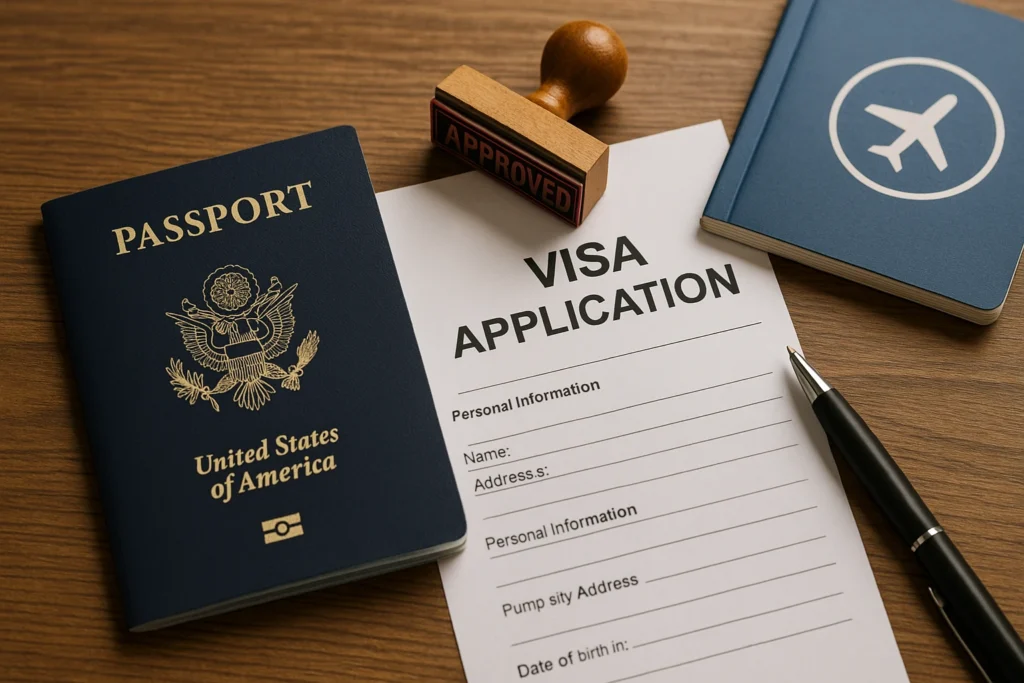Digital nomads are location-independent professionals who work remotely whilst travelling frequently between different countries. Expats are individuals who take traditional jobs in one specific country and typically stay there for years. The key difference lies in employment structure: nomads work for multiple clients or remote employers, whilst expats have local employment contracts.
Digital nomads prioritise flexibility and freedom over job security, often facing income fluctuations in exchange for the ability to work from anywhere. Expats choose stability and career progression through traditional employment abroad, receiving benefits like health insurance and steady salaries.
In this article, we’ll explain exactly what each lifestyle involves, how they compare financially, and which one might suit your situation. We’ll also cover visa requirements, health insurance options, and the social challenges you’ll face with either choice.
Income Stability: The Financial Truth About Working Overseas
Money talks, especially when you’re trying to build a career abroad.
The financial reality differs dramatically between nomadic freelancing and traditional expat employment because nomads operate as independent businesses, while expats receive traditional employee benefits. Nomads face income uncertainty but unlimited earning potential, whereas expats trade flexibility for financial security and structured compensation packages. These fundamental differences affect everything from your monthly budget to long-term financial planning.
The income patterns couldn’t be more different:
- Digital Nomads: You’re essentially running a business with those dreaded feast-or-famine cycles where your income can swing wildly from month to month. Sure, the pay can be better than traditional jobs (UK remote workers average £42,470 compared to the national average of £37,430). However, this extra income comes with a major downside: you never know when your next payment will arrive or if an important client might suddenly drop you.
- Expat Employees: Traditional expat positions provide steady salaries with predictable monthly payments. Your employer handles tax withholdings, provides health insurance, and often contributes to retirement savings. The trade-off? You’re locked into working specific hours for one company, with less flexibility to scale income quickly.
From our experience, professionals who choose the nomad route require strong financial discipline. This becomes clear when you consider that freelancers spend roughly 60%-85% of their total work time on billable client work, with the rest going toward finding new clients and handling admin tasks.
Of course, earning money abroad means nothing if you can’t legally work there in the first place…
Visa Requirements: Your Legal Gateway to Working Abroad

Understanding visa requirements used to be a nightmare, but the situation has shifted dramatically in favour of remote workers. Today’s options give you far more flexibility than the traditional “find a job first, get sponsored” approach that dominated for decades.
Breaking down your three main pathways:
Digital Nomad Visas: The Game Changer
These relatively new visas let you work remotely for clients anywhere in the world while living in a different country entirely. Countries like Portugal with their D7 visa, Estonia’s digital nomad visa, and Barbados’ Welcome Stamp have made this lifestyle legally accessible.
Before you start packing, though, you’ll need to prove you’re making a steady income first. Most countries want to see anywhere from £1,200 per month if you’re heading somewhere affordable to over £5,500 per month for fancier spots like Iceland. Then you wait around 2-12 weeks for them to process everything and give you the thumbs up.
Traditional Work Permits: The Reliable Option
Classic expat visas still dominate for those wanting permanent positions. Your future employer will sponsor your application, handling most of the bureaucracy. However, processing varies wildly. For example, Australia might take 3 months, while Canada could stretch to 8 months.
Though the process sounds overwhelming, there is a bright side to all that waiting: you get complete legal protection and clear pathways to residency.
Freelancer Visas: The Middle Ground
Countries like Germany and the Netherlands offer these for independent contractors planning to serve local markets. But the requirements tend to be stricter and often demand proof of unique skills or established client relationships.
Also, remember that different visa types affect your tax obligations back home differently. Once you’ve got the paperwork sorted, you’ll also need proper health coverage that works internationally.
Health Insurance That Protects You Properly

Medical emergencies abroad can destroy your finances faster than you can say “ambulance.” The wrong coverage leaves you choosing between proper treatment and bankruptcy, which is hardly the international adventure you planned.
If your coverage needs depend entirely on your working arrangement, you have to pay close attention to these essential coverage areas when working abroad:
- Emergency Hospital Care: Heart attacks and accidents don’t check your bank balance first. Without proper coverage, a single night in a Swiss hospital could cost a person their full monthly earning.
- Ongoing Prescriptions: If you take regular medication like insulin or blood pressure pills, you’ll need them abroad too. Many travel policies don’t cover prescriptions, which means you could pay hundreds of pounds each month for medicines you need to stay healthy.
- Mental Health Services: Therapy becomes essential if your mild homesickness is diagnosed as depression after a few weeks. It’s because quality mental health support abroad often costs £100 per session without insurance. Yes, that’s terrible when you look at the charge!
- Specialist Consultations: You might need to see a dermatologist for a skin issue or a cardiologist for chest pains whilst abroad. Such appointments can run £200-£500 depending on the country and treatment needed.
- Repatriation Coverage: Sometimes you need to get home for treatment, and medical flights cost £50,000. This coverage becomes your lifeline when local medical facilities can’t handle your condition.
Digital nomads often find themselves stuck with basic travel insurance that has major gaps. Meanwhile, expats typically receive employer-provided plans with comprehensive coverage that rivals top-tier policies back home.
Community Building: Beating Isolation and Culture Shock

The loneliness can hit harder than any visa rejection or income drought. Most people don’t see it coming. That’s why building genuine connections abroad requires intentional effort. But how do you know which one’s going to work for you? Well, that depends on whether you plan to stay in one place long-term or move around frequently.
Digital nomads face the revolving door problem because they’re constantly moving. Let’s be honest here, just when you’ve found your favourite coffee shop and made a few friends, it’s time to move on.
You need to understand that avoiding connections isn’t the solution, because you’ll miss out on meaningful relationships. The answer is building them faster and deeper by being proactive from day one. Start by introducing yourself to neighbours, joining local activities immediately, and saying yes to social invitations even when you’re tired from travel.
Successful nomads we’ve worked with treat their first week in any new place like a social boot camp. They join co-working spaces, attend every meetup that sounds remotely interesting, and say yes to invitations even when they’d rather stay home.
However, expats have the opposite challenge. Your workplace provides instant social structure, but it can become a comfortable prison.
Surprisingly, many expats spend years abroad without forming a single meaningful friendship with locals. They create mini versions of their home country, complete with familiar restaurants and English-speaking social circles.
What’s common in both groups is the culture shock they experience while adjusting to a new country. Nomads experience it in rapid-fire bursts, whilst expats face one prolonged adjustment period.
I hope you have a clear picture of what each lifestyle truly involves. Let’s work out which one suits your specific situation…
Choosing Your Perfect Working Abroad Lifestyle
With all the facts laid out, the choice comes down to matching your personality and circumstances with the right opportunity.
Ask yourself these important questions:
- Can you handle income uncertainty for the sake of freedom?
- Do you work well in constantly changing environments or prefer stability?
- Are you comfortable being your own boss, or do you work better with structured employment?
Digital nomadism suits risk-takers who value flexibility over security. This path requires strong self-discipline and financial reserves.
Expat life, by contrast, appeals to those wanting adventure with a safety net. You get international experience whilst maintaining career progression and financial stability.
If you’re still unsure which path fits your situation, professional guidance can help. At Brian Mathews, we’ve helped thousands of professionals transition to working abroad successfully.








 </a
</a